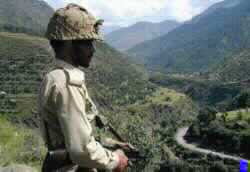SOGAM, India (Islamweb & News Agencies) - India has blamed Pakistan for the assassination of a state minister in Kashmir, stoking fears of renewed tensions between the nuclear rivals over the disputed Himalayan region
Two Pakistan-based Kashmiri nationalist groups have claimed responsibility for gunning down Law Minister Mushtaq Ahmed Lone on Wednesday, the first slaying of a senior Indian politician in a decade.
Kashmiri nationalists have pledged to derail the state election that begins on Monday and more than 300 people, including another candidate and several party workers, have been killed since the poll was announced in early August.
The 45-year-old Lone, one of Kashmir's most heavily guarded leaders, was gunned down as he addressed an election rally ahead of Monday's first round of voting for a new Jammu and Kashmir state assembly.
India's junior foreign minister, Omar Abdullah, who heads Kashmir's ruling National Conference party, blamed Pakistan for Lone's slaying at Tikkipora village, near his home village of Sogam.
India and Pakistan are locked in a military stand-off over Kashmir that brought them close to another war this year and New Delhi has said the level of violence during the election would be a crucial indication of Islamabad's pledge to stop Islamic separatists crossing into Kashmir.
Three of Lone's police bodyguards were also killed and in separate attacks 12 others died on Wednesday.
A spokesman for the Pakistan-based Lashkar-e-Taiba, one of the largest groups fighting Indian rule in Kashmir, called the Kashmir Press Service to claim responsibility for Lone's killing, the most prominent assassination since a suicide bomber killed former prime minister Rajiv Gandhi in 1991.
Lashkar is one of two groups India blames for a December attack on its parliament that triggered the latest crisis with Pakistan and a May attack on an army camp in Kashmir that brought the countries close to their third war over Kashmir since independence in 1947.
A previously unknown group, Al-Arifeen, also called the agency to claim responsibility.
India wants a big turnout and a peaceful poll to bolster the legitimacy of its rule in the state. But the main Kashmiri nationalist alliance, the All Parties Hurriyat (Freedom) Conference, has urged a boycott, saying the election cannot be a substitute for 1948-49 U.N. resolutions calling for a vote to decide the territory's future.
Fears of violence, as well as general disillusionment with New Delhi's rule, have dampened campaigning.
Most election rallies attract only a few people, many either party faithful bussed in for the event or bemused passers-by. Rallies are protected by scores of heavily armed paramilitary troops and leading politicians appear only briefly.
An extra 45,000 soldiers, paramilitary and police have been brought into Jammu and Kashmir, mainly Hindu India's only Muslim majority state, to boost security for the election, in addition to the 450,000 already here.
The state virtually closes down at dusk. Streets are deserted and dark. Many villages have no electricity.
Security around Sogam has been stepped up ahead of Lone's burial on Thursday, which is due to be attended by Defense Minister George Fernandes.
The 13-year battle against Indian rule in Kashmir is one of the world's bloodiest and has killed more than 2,000 people so far this year. India says more than 35,000 people have died in the revolt, but separatists put the death toll above 80,000.
PHOTO CAPTION
A soldier of the Pakistani army stands alert along the Line of Control in Chakoti in Pakistani Kashmir, Wednesday, Sept. 11, 2002. Pakistan and India are on high tension over the Kashmir dispute. (AP Photo/Roshan Mugha
- Author:
& News Agencies - Section:
WORLD HEADLINES


 Home
Home Discover Islam
Discover Islam Quran Recitations
Quran Recitations Lectures
Lectures
 Fatwa
Fatwa Articles
Articles Fiqh
Fiqh E-Books
E-Books Boys & Girls
Boys & Girls  Women
Women










